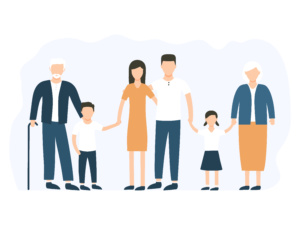The Importance of Maintaining
Healthy Family Relationships
Article Courtesy of | Comfort Keepers
The greatest gifts parents give children are nurturing and caring for them as they grow into adults. In doing so, parents teach children to establish healthy relationships within the family unit and beyond, helping children grow into happy, well-adjusted, and successful adults. As life comes full circle, children often have the opportunity to return this gift by caring for their parents as they reach their senior years.
Caregiving for a family member can be pleasing and challenging. It presents a unique set of circumstances that both the senior and the caregiver must learn to embrace. The senior who needs care often feels displaced, perhaps inadequate, and even resentful that they need care. The family caregiver feels happiness in being able to help as well as sadness in watching a parent’s health decline. Family caregivers often feel taken for granted, unappreciated, exhausted with accompanying guilt for feeling that way.
Maintaining healthy family relationships is critical during this time. For the senior, having other family members visit breaks the monotony of what might otherwise be a mundane day. Whether visits last a short period of time or perhaps an entire afternoon, time spent together can mean the world to a senior. These occasions give the senior something to look forward to which helps increase the senior’s sense of purpose and decreases feelings of isolation. Family members who live far away can also contribute by writing letters, sending pictures and by calling the senior often. These times offer the family member(s) and senior a chance to strengthen their own relationship, love, and respect for one another.
The dynamics of any family are sometimes complicated. Some family members may be negative or abrasive which can be more harmful than good for the senior and caregiver alike. In trying to build healthy relationships, plan short visits and events that these personalities may find fun and meaningful. Viewing old photographs or playing a simple game of cards might generate happy moods and good memories for all.
A strong family unit and support system are essential when caring for a senior loved one. The senior and family caregiver both benefit from these relationships. However, family caregivers also need breaks in order to take care of aspects of their own lives or simply a mental rest. Help from family members contributes to their wellbeing, too.
If family help is unavailable, the caregiver should seek outside help. In-home health care providers such as Comfort Keepers® provide respite care for the family caregiver and supplementary social interaction with the senior. These breaks from each other offer both the senior and family caregiver a chance to rejuvenate and appreciate the role each plays in the other’s life; this facilitates a continued healthy relationship.


